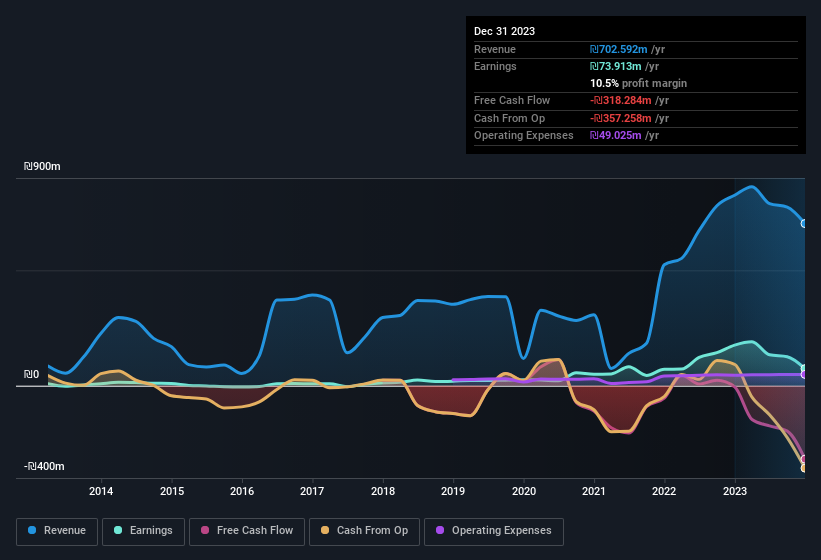- Israel
- /
- Real Estate
- /
- TASE:ROTS
Rotshtein Realestate's (TLV:ROTS) Sluggish Earnings Might Be Just The Beginning Of Its Problems

The subdued market reaction suggests that Rotshtein Realestate Ltd's (TLV:ROTS) recent earnings didn't contain any surprises. Our analysis suggests that along with soft profit numbers, investors should be aware of some other underlying weaknesses in the numbers.
See our latest analysis for Rotshtein Realestate

Examining Cashflow Against Rotshtein Realestate's Earnings
In high finance, the key ratio used to measure how well a company converts reported profits into free cash flow (FCF) is the accrual ratio (from cashflow). In plain english, this ratio subtracts FCF from net profit, and divides that number by the company's average operating assets over that period. You could think of the accrual ratio from cashflow as the 'non-FCF profit ratio'.
Therefore, it's actually considered a good thing when a company has a negative accrual ratio, but a bad thing if its accrual ratio is positive. While having an accrual ratio above zero is of little concern, we do think it's worth noting when a company has a relatively high accrual ratio. To quote a 2014 paper by Lewellen and Resutek, "firms with higher accruals tend to be less profitable in the future".
Over the twelve months to December 2023, Rotshtein Realestate recorded an accrual ratio of 0.28. Unfortunately, that means its free cash flow was a lot less than its statutory profit, which makes us doubt the utility of profit as a guide. Even though it reported a profit of ₪73.9m, a look at free cash flow indicates it actually burnt through ₪318m in the last year. Coming off the back of negative free cash flow last year, we imagine some shareholders might wonder if its cash burn of ₪318m, this year, indicates high risk.
Note: we always recommend investors check balance sheet strength. Click here to be taken to our balance sheet analysis of Rotshtein Realestate.
Our Take On Rotshtein Realestate's Profit Performance
Rotshtein Realestate's accrual ratio for the last twelve months signifies cash conversion is less than ideal, which is a negative when it comes to our view of its earnings. Because of this, we think that it may be that Rotshtein Realestate's statutory profits are better than its underlying earnings power. Nonetheless, it's still worth noting that its earnings per share have grown at 29% over the last three years. The goal of this article has been to assess how well we can rely on the statutory earnings to reflect the company's potential, but there is plenty more to consider. With this in mind, we wouldn't consider investing in a stock unless we had a thorough understanding of the risks. For example, Rotshtein Realestate has 4 warning signs (and 2 which shouldn't be ignored) we think you should know about.
This note has only looked at a single factor that sheds light on the nature of Rotshtein Realestate's profit. But there are plenty of other ways to inform your opinion of a company. Some people consider a high return on equity to be a good sign of a quality business. So you may wish to see this free collection of companies boasting high return on equity, or this list of stocks that insiders are buying.
New: AI Stock Screener & Alerts
Our new AI Stock Screener scans the market every day to uncover opportunities.
• Dividend Powerhouses (3%+ Yield)
• Undervalued Small Caps with Insider Buying
• High growth Tech and AI Companies
Or build your own from over 50 metrics.
Have feedback on this article? Concerned about the content? Get in touch with us directly. Alternatively, email editorial-team (at) simplywallst.com.
This article by Simply Wall St is general in nature. We provide commentary based on historical data and analyst forecasts only using an unbiased methodology and our articles are not intended to be financial advice. It does not constitute a recommendation to buy or sell any stock, and does not take account of your objectives, or your financial situation. We aim to bring you long-term focused analysis driven by fundamental data. Note that our analysis may not factor in the latest price-sensitive company announcements or qualitative material. Simply Wall St has no position in any stocks mentioned.
About TASE:ROTS
Rotshtein Realestate
Develops and constructs residential projects in Israel.
Solid track record and good value.
Market Insights
Community Narratives



